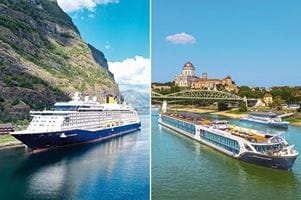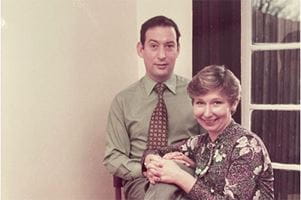Experiences
A voyage to the past

One Saga customer finds himself on a personal journey to the past as he travels to the place his father was held as a prisoner of war for five years.
“It was very, very quiet.”
“There was not a sound of any bird song at all. Absolutely nothing. And I stood there, and I looked out across the view, and I thought, bloody hell, my dad must have looked out at that.”
Setting sail aboard Spirit of Discovery from Dover in late August this year, Bob Girardot was on a mission. He was to visit the place where his father had been interned as a prisoner of war (POW) for five years during World War II. It was a trip that he had been meaning to make for some time, and now he was determined to make it happen.
When he saw a Scandinavia cruise calling in at Gdansk, Poland, he knew he had to be on board. This was the moment, he decided, that he would embark on his journey to the place that shaped his father’s life.
“I said, ‘It’s going to Gdansk so I’m going. I’m going, I don’t care if I’m going on my own – I’m going.’” Bob explains.
“And that was it. I was focussed on Gdansk.”
Captured
Located in the district of Malbork, Poland, Stalag XX-B was where Bob’s father, Arthur Frederick Girardot, had been imprisoned. It was one of approximately 1,000 Nazi POW camps in operation during the war.
Life at the prison camps was hard. Thousands of prisoners were crammed into fields bordered by barbed wire, sometimes with no shelter to sleep under – life-threatening in harsh Polish winters. There were often no showers, or disinfection stations, and food rations were intended only for survival.
First-hand accounts of conditions in such camps paint a dire picture. “This book I read about the camp, one of the fellas didn’t take his boots and socks off for 18 months and they sort of more or less welded to his feet,” says Bob. “It was just awful – you just can’t begin to imagine!”
Born in 1911, Arthur Fredrick Girardot – “a born and bred London Cockney,” says Bob – joined up in September 1939, becoming a member of the 51ST Highland Division.
Part of the British Expeditionary Force (BEF) in France, and later attached to the French Third Army, the 51ST Highlanders were stationed in the Saarland area when in May 1940 – against expectation – the Germans broke through the fortified Maginot Line.
Cut off from help and suffering heavy casualties, the division forced a retreat, but they were outflanked. An escape route to Le Havre no longer an option, the Highlanders were positioned around the perimeter of the port town of St.Valéry-en-Caux, awaiting evacuation.
But the evacuation failed to materialise. Amid fog and heavy shelling, the 200 small boats assembled to rescue the troops could not reach them in time.
At 10:30 a.m. on Wednesday 12 June 1940, the surrender was given and an estimated 10,000 51st Highland Division troops were taken as prisoners of war. Marched through Germany and crammed into cattle wagons.
Others have described such journeys as a ‘hellish nightmare’. They were ‘pushed into cattle trucks, each holding around 80 POWs, with many of the men suffering from dysentery caused by eating the mouldy bread.’
“He was a survivor.”
The Highlanders eventually ended up in POW camps near Gdansk, German-occupied Poland. Stalag XX-B (20B), where Arthur Girardot was imprisoned, was one of serval subcamps in the area. Reports state that by 1945, some 8,000 prisoners were interned there, many put to labour in factories and on surrounding farmland.
With the advance from the Soviets in 1945, tens of thousands of POWs were forced to march westwards – a long, horrific ordeal through freezing conditions. This movement of people is now collectively known as ‘The March’.
Like many who live through war, Bob’s father didn’t speak much about his time he spent as a prisoner. “There wasn’t much said, just one or two snippets here and there,” recalls Bob.
“My dad was such a tiny little fella, he was only five-foot four, eight or nine stone. When he got back, he had typhoid and typhus, the MO (medical officer) said, ‘You’ve got no right to be here still standing!’ He was in hospital for quite a long time after.”
In 1950 Bob came along, and when he was old enough, used to go out with his father who worked as a lorry driver in the catering industry.
“He was a survivor,” Bob says. “He was always ducking and diving.” Arthur Frederick Girardot would still meet up with his POW friends, have a drink and play cards, right up to his death in 1985.
A son’s journey
Now retired, Bob became increasingly interested in visiting the places that his father had been during the war. A cruise which called in at Gdansk was the perfect opportunity to pay respects to his father’s memory.
“I emailed Saga’s excursion team to see if they could work out a way to get me to Malbork,” he explains. “And that’s what they did, bless ‘em – they were absolutely brilliant. I just couldn’t fault them!”
As Bob set off on the emotional journey, the team at Saga knew they wanted to make his trip to the prison camp a special day to remember. On day two of the cruise, Bob spoke to the on-board excursions manager, who delivered a pleasant surprise.
“They said, ‘Under the circumstances, considering what you’re doing, we’re going to cover it free of charge for you,’” Bob explains.
“I said ‘What? You don’t have to do that’ – but they said ‘No, no, it’s all sorted sir.’”
In memoriam
The next morning, just before ten o’clock, Bob made his way down to the quayside. A chauffeur and his Mercedes were waiting to whisk him off to a place he had known about for so many years.
It was a hot day. The sky was clear and the air was still.
A memorial now stands at the quiet site of the prison camp. One corner of a brick wall is marked with the dates 1939-1945, accompanied by words from the local community in Malbork: ‘In memory of those who died and those who survived.’
Wearing his father’s service medal on his chest, Bob laid a wreath. He had brought it with him from the British Legion in Maidstone.
“It was so, so moving. My Dad was here. He could have stood in this very spot, breathing the air I’m breathing, and seeing the view I’m seeing,” he says.
Bob took a moment to himself, taking in the views from the former prison camp’s elevated location.
“I looked up at the sky and I thought, ‘Well he’s seen all this’, and I was terribly moved. There was a bench, and I sat and cried my eyes out. I just couldn’t stop.”
Bob’s emotional excursion continued. He visited a local museum – closed that day but a member of staff opened it up just for him – with an exbibit dedicated to the history of Stalag XX-B. Later his friendly driver joined him for a drink at a local café.
Make the leap
Bob is now back at home in Margate. It’s a sunny day, much like the day he visited the memorial, and he’s drinking his morning coffee, remembering with fondness the trip that he had just taken.
“It was literally a trip of a lifetime,” he says with a smile.
“I mean, it wasn’t an exotic destination. People go to the Seychelles or Bahamas or the Caribbean, but that was literally a trip of a lifetime. I wouldn’t be able to replicate that again. It was just brilliant.”
“I can’t thank Saga enough for doing it. It was just such an experience.”
After embarking on a voyage of discovery, and standing in the spot his father stood 80 years before, I asked what advice he would give to others thinking about taking a meaningful trip like his.
Bob answers with certainty. “I would say, don’t think about it, don’t hesitate – do it. This is not a rehearsal, this is it. You get one chance. Do it,” he says.
“Don’t hesitate. If you think you can, do it.” “I couldn’t have asked for anything better,” he says, happily. “Everything was perfect, from the moment I stepped off the ship to the moment I stepped back on it again.”
- Rebecca Saunders
The opinions expressed are those of the author and are not held by Saga unless specifically stated.
The material is for general information only and does not constitute investment, tax, legal, medical or other form of advice. You should not rely on this information to make (or refrain from making) any decisions. Always obtain independent, professional advice for your own particular situation.





